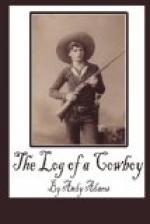Honeyman was left-handed and threw a rope splendidly; and as we circled around the horses on opposite sides, on a signal from him we whirled our lariats and made casts simultaneously. The wrangler fastened to the brown I wanted, and my loop settled around the neck of his unridden horse. As the band broke away from our swinging ropes, a number of them ran afoul of my rope; but I gave the rowel to my grulla, and we shook them off. When I returned to Honeyman, and we had exchanged horses and were shifting our saddles, I complimented him on the long throw he had made in catching the brown, and incidentally mentioned that I had read of vaqueros in California who used a sixty-five foot lariat. “Hell,” said Billy, in ridicule of the idea, “there wasn’t a man ever born who could throw a sixty-five foot rope its full length—without he threw it down a well.”
The sun was straight overhead when we started back to overtake the herd. We struck into a little better than a five-mile gait on the return trip, and about two o’clock sighted a band of saddle horses and a wagon camped perhaps a mile forward and to the side of the trail. On coming near enough, we saw at a glance it was a cow outfit, and after driving our loose horses a good push beyond their camp, turned and rode back to their wagon.
“We ’ll give them a chance to ask us to eat,” said Billy to me, “and if they don’t, why, they’ll miss a hell of a good chance to entertain hungry men.”
But the foreman with the stranger wagon proved to be a Bee County Texan, and our doubts did him an injustice, for, although dinner was over, he invited us to dismount and ordered his cook to set out something to eat. They had met our wagon, and McCann had insisted on their taking a quarter of our beef, so we fared well. The outfit was from a ranch near Miles City, Montana, and were going down to receive a herd of cattle at Cheyenne, Wyoming. The cattle had been bought at Ogalalla for delivery at the former point, and this wagon was going down with their ranch outfit to take the herd on its arrival. They had brought along about seventy-five saddle horses from the ranch, though in buying the herd they had taken its remuda of over a hundred saddle horses. The foreman informed us that they had met our cattle about the middle of the forenoon, nearly twenty-five miles out from Powder River. After we had satisfied the inner man, we lost no time getting off, as we could see a long ride ahead of us; but we had occasion as we rode away to go through their remuda to cut out a few of our horses which had mixed, and I found I knew over a dozen of their horses by the ranch brands, while Honeyman also recognized quite a few. Though we felt a pride in our mounts, we had to admit that theirs were better; for the effect of climate had transformed horses that we had once ridden on ranches in southern Texas. It does seem incredible, but it is a fact nevertheless, that a horse, having reached the years of maturity in a southern climate, will grow half a hand taller and carry two hundred pounds more flesh, when he has undergone the rigors of several northern winters.




